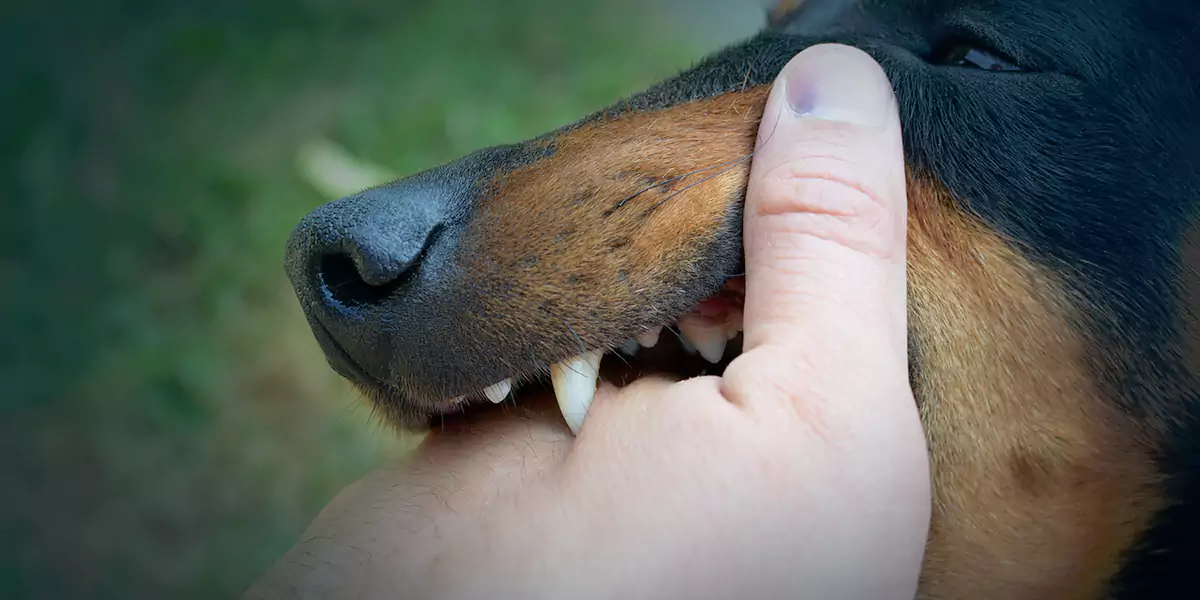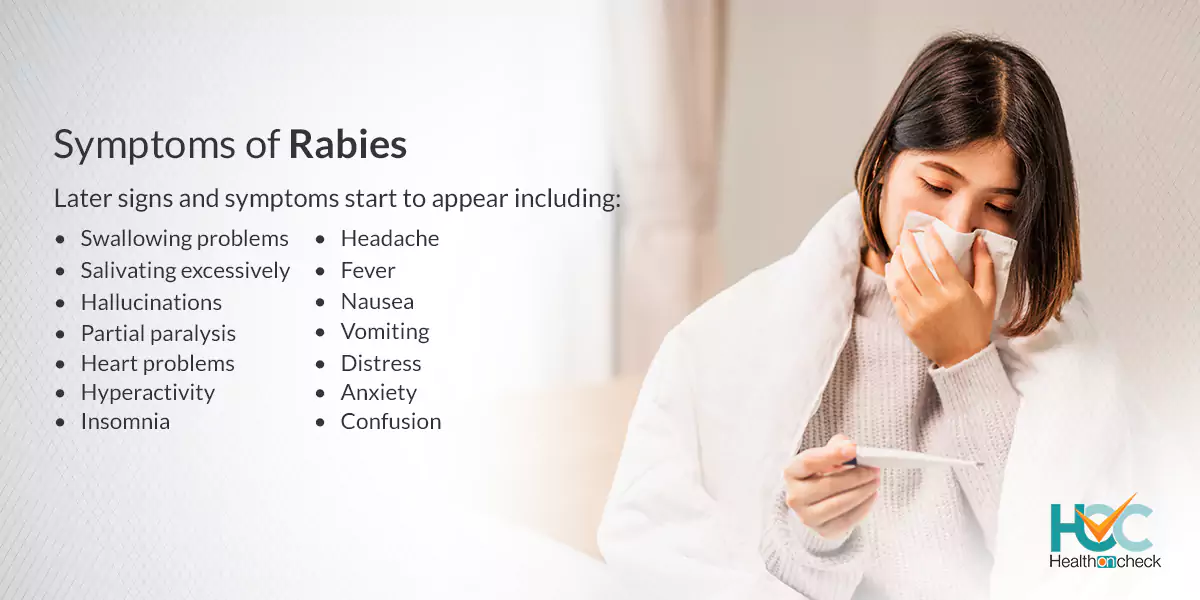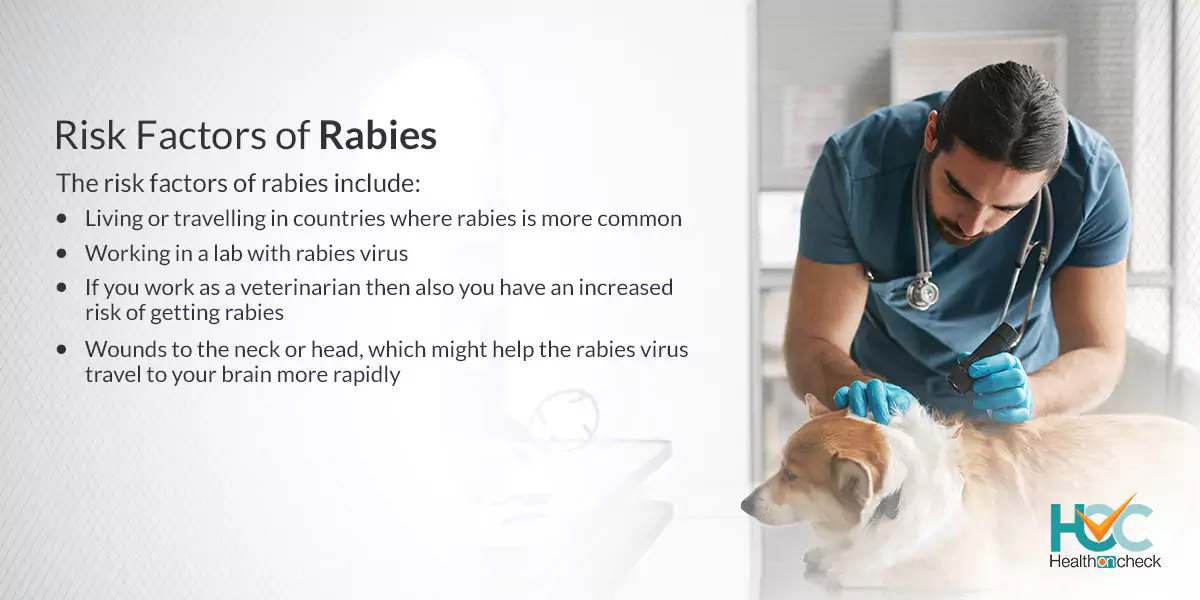What is Rabies?

Rabies is a disease you can get from an infection with the RABV virus and this virus is transmitted into your body when the saliva (spit) of an infected animal enters your body through an open wound (generally from a bite). Rabies is life-threatening but can be prevented if prompt action is taken after getting exposed to the virus. You are most likely to get rabies if you are bitten or scratched by an animal infected with RABV virus. Animals that are most likely to transmit rabies include dogs, bats, foxes, coyotes, skunks, and raccoons. Once a person starts to show signs and symptoms of rabies, it almost certainly leads to death. Due to this reason, anyone having a risk of contracting rabies should always receive rabies vaccinations for safety.
What are the Types of Rabies?
There are two types of rabies including:
– Furious rabies
This type of rabies results in hyperactivity, hallucinations, excitable behaviour, coordination problem, hydrophobia (fear of water), and aerophobia (fear of drafts or fresh air). People with it usually die within a few days because of cardio-respiratory arrest.
– Paralytic rabies
This type of rabies accounts for nearly 20% of the total number of human cases. The muscles of people with this type of rabies slowly become paralysed, beginning from the wound site. Then gradually a coma develops and finally death occurs. The paralytic type of rabies is mostly misdiagnosed, causing under-reporting of the disease.

What are the Symptoms of Rabies?
The first symptoms of rabies are usually quite similar to those of the flu and might last for days.
Later signs and symptoms start to appear including:
– Fever
– Headache
– Nausea
– Vomiting
– Distress
– Anxiety
– Confusion
– Hyperactivity
– Swallowing problems
– Salivating excessively
– Fear of water (hydrophobia) because of difficulty in swallowing fluid
– Fear of air blown on the face
– Hallucinations
– Insomnia
– Coma
– Partial paralysis
– Heart problems
What are the Causes of Rabies?
The virus known as RABV is the main cause of rabies in humans and animals. It enters your body when an infected animal bites you and from there, it gradually starts moving along nerves into your central nervous system after reaching your brain, the damage results in neurological symptoms which eventually cause coma and then death. Warm-blooded animals (mammals) are the carriers of this deadly virus which is present in their saliva (spit).
Rabies is most commonly found in bats, cats, dogs, skunks, raccoons, and foxes. If you have a wound or any type of break in your skin that comes in contact with the spit of an infected animal, then also you can get rabies.
In very rare cases, people developed rabies after receiving donated organs from people who had rabies.
What are the Risk Factors of Rabies?
The risk factors of rabies include:
– Living or travelling in countries where rabies is more common
– Doing tasks that might get you in contact with wild animals that might have rabies, including going into caves where bats reside or camping without taking adequate precautions to keep wild animals away from your campsite
– If you work as a veterinarian then also you have an increased risk of getting rabies
– Working in a lab with rabies virus
– Wounds to the neck or head, which might help the rabies virus travel to your brain more rapidly
What are the Complications of Rabies?
The complications of rabies include:
– Seizures.
– Fasciculations.
– Psychosis.
– Aphasia.
– Autonomic instability.
– Paralysis.
– Coma.
– Cardiovascular disease
– Death.
How Rabies is Diagnosed?
If an infected animal bites you, it’s impossible to know if the animal has transmitted the rabies virus to you and it’s quite common to not find bite marks. If you are bitten by such an animal then your doctor might prescribe several tests to detect the rabies virus, but they might require to be repeated later to ensure whether you’re carrying the virus. In case an animal that may be a carrier of the rabies virus bites you, then your doctor will ask you to begin treatment as soon as possible to prevent the rabies virus from infecting your body.
To diagnose rabies your doctor first might ask you a few questions including:
– How you got bitten or scratched.
– Query regarding the type of animal scratched or bit you.
– Is it possible to test or observe the animal?
If there is any chance that the animal had rabies, then if possible, it’ll be watched for signs or tested. Animals have to be euthanized (humanely killed) to test them.
Tests to diagnose rabies might include:
– Saliva test
Here you need to spit into a tube which will be then sent to a lab to look for signs of rabies.
– Skin biopsy
A small sample of skin from the back of your neck will be taken and will be sent to a lab to check for signs of rabies.
– Cerebrospinal fluid test (lumbar puncture)
In this procedure, your doctor will use a needle to take a cerebrospinal fluid (CSF) from your lower back and then it will be sent to a lab to check for signs of rabies.
– Blood tests
Here your blood sample will be taken, usually from your arm and then it will be sent to a lab to look for signs of rabies.
– MRI
In this procedure you will be made to lie in a machine and pictures of your brain will be taken. These pictures will be used to get information about what’s causing your symptoms.
What are the Treatment Options Available for Rabies?
Once a rabies infection reaches your brain, there is no treatment to prevent or cure it and death is almost certain. Because of this, if it’s likely that you’ve been exposed to rabies, it’s important to receive a series of shots to prevent the infection from spreading further.
Treatment for people bitten by animals with rabies
If an animal known to have rabies bites you, you will be given a series of shots to stop the rabies virus from infecting you. If the animal that bit is not found, it’s usually assumed that the animal has rabies. But this normally depends on various factors, including the type of animal and the situation in which the animal bit you.
Rabies shots include:
– A fast-acting shot (rabies immune globulin) is given to stop the virus from infecting you.
This shot is usually given in case you haven’t had the rabies vaccine. This injection is given near the place where the animal bit you, as soon as possible after the bite.
– A series of rabies vaccinations to aid your body in identifying and killing the rabies virus.
Rabies vaccinations are given in the form of injections in your arm. When a possibly infected animal bites you, you will be given the first injection usually under 24 hours, and four more injections over 14 days.
It’s quite important to take preventive measures to prevent rabies if you’ve been scratched or bitten by an animal:
The first thing you need to do is wash the wound immediately with soap and water. If available use a 10% povidone-iodine solution.
– After this contact a doctor as soon as possible and give them all the information about what happened along with the information about the animal such as whether it was a wild animal or a pet.
– Ask your doctor to clean the wound in the best possible way and whether a rabies vaccine is needed.
– Your doctor will give you a rabies immune globulin or a rabies vaccine based on the diagnosis.
Once rabies moves to your brain, there is no cure and death is almost certain in a few days.
Living with Rabies
Rabies is a severe condition where if treatment is not given in the required period, it reaches your brain and leads to neurological symptoms. From there, rabies results in coma, and death is almost certain. Children are more likely to get rabies than adults because most of the time they don’t tell others if any animal bites them or is too small to tell. So it’s quite important to keep a check on your child if any possible rabies carrier animal is in the vicinity of your child. If you or anyone you know has been bitten by an animal, contact your doctor right away.
Whom to Consult?
Seek immediate medical care if any animal bites you or you are exposed to an animal suspected of having rabies then seek immediate medical care. Depending on your injuries and the situation in which the exposure occurred, your doctor will decide you should need treatment to prevent rabies. Even in instances you are not sure whether you’ve been bitten, you should get medical assistance. Also, if you find an animal near a small child or a person with a disability, who can’t report if they have been bitten, you shall assume that person has been bitten and consult with your doctor immediately.





